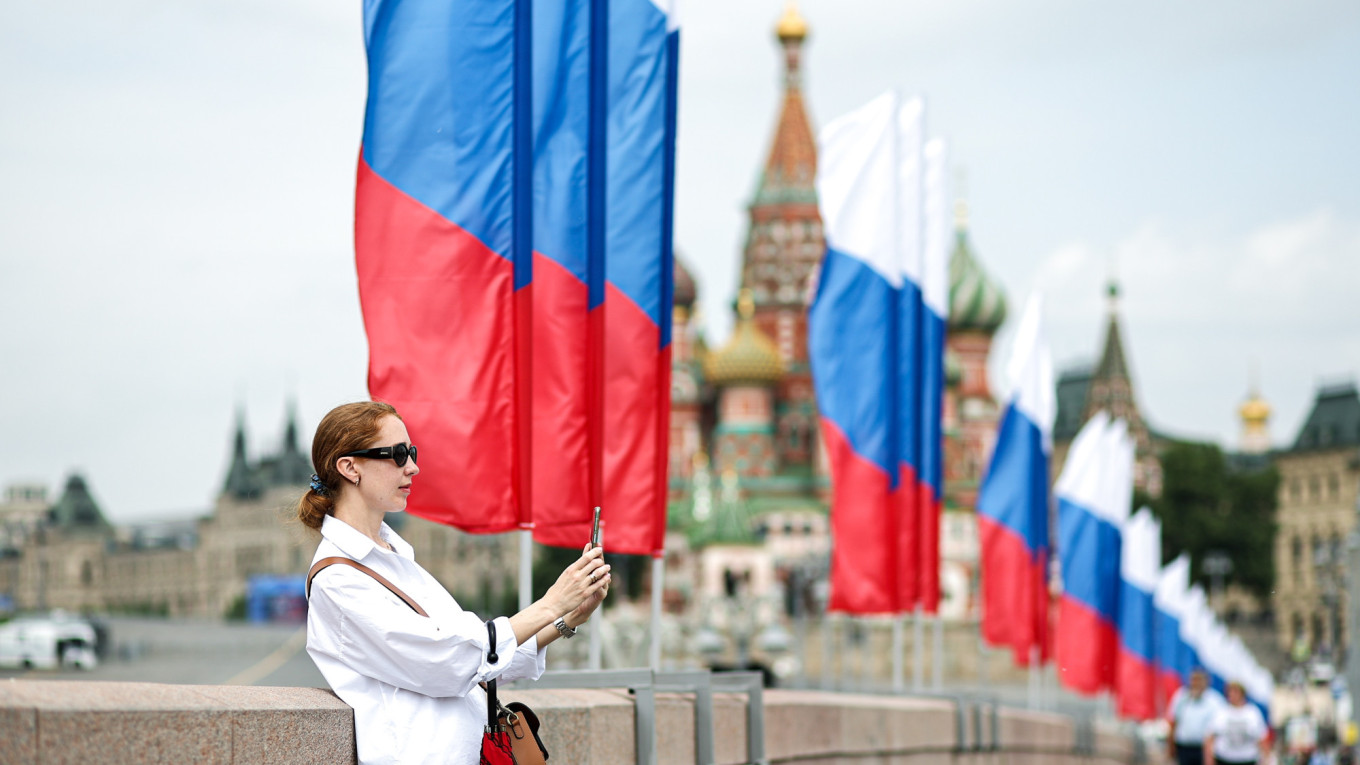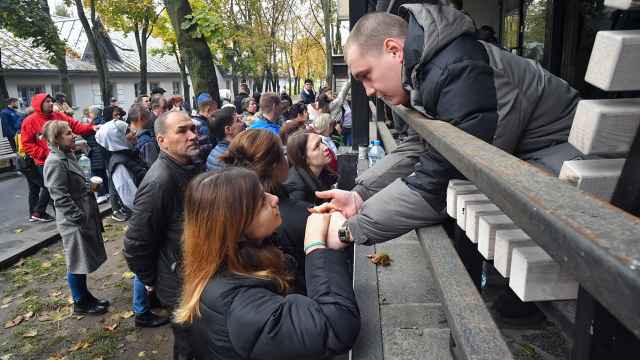On New Year’s Eve, 22-year-old Vika shared an unboxing of the new iPhone 16 with her Instagram followers. The phone, she said, was a gift from her husband, a serviceman fighting with the Russian army in Ukraine.
“As he [my husband] said: ‘Only the best for my wife’,” Vika said of her gift, which costs hundreds of dollars more in Russia than in the U.S.
Faced with a shortage of men willing to carry out its invasion of Ukraine, which has killed thousands of Ukrainian civilians, Russia has gradually hiked financial incentives for signing a military contract. This has given many men and their families an unprecedented means of upward social mobility, creating a new social class described by President Vladimir Putin as Russia’s “new elite.”
As these military households come into their newfound wealth, soldiers’ wives and girlfriends are taking to social media to show off their comfortable new lives, often while espousing their pro-war, pro-Kremlin views.
Russia banned Instagram soon after invading Ukraine in 2022, while TikTok banned new uploads inside Russia. But this hasn’t stopped Vika and many other Russians from continuing to use the widely popular apps.
On Instagram, Vika shares tips for decorating the temporary military housing unit provided by the government for her serviceman husband in a Pinterest-inspired style. Vika selects home decor from popular Russian online marketplaces and documents her choices in her videos.
Her unboxing videos usually open with her signature phrase: “As long as I have money, you’ll have reviews.”

In 2025, Russian authorities are continuing to increase payments for contract soldiers participating in the war in Ukraine.
From January, men who sign a military contract in the Samara region will receive a one-time payout of up to 4 million rubles ($38,900) — the highest of any region in the country.
In addition to these one-time payouts, which vary by region, military personnel also receive a monthly salary of at least 210,000 rubles ($2,000). In the event of a soldier’s death, their family is entitled to a “funeral allowance,” which can amount to up to 5 million rubles ($48,600), according to a presidential decree.
The substantial payouts to contract soldiers are part of the authorities’ efforts to turn the military into the country’s new elite, says historian Dmitry Dubrovsky.
“One of the key outcomes of the ongoing war is the attempt to construct a ‘Putin Elite 2.0’ to replace the original elite that emerged in the early 2000s, built on oil and gas revenues,” Dubrobsky said. “This process began as early as 2014, when the ‘heroes of the Russian Spring’ gradually started integrating into Putin’s regime. However, it became fully evident with the onset of the full-scale aggression [against Ukraine].”
In addition to million-ruble payouts, the state also provides military personnel with subsidized mortgages and free university education for their children, including at prestigious institutions such as Moscow State University and the Higher School of Economics.
Nearly 15,000 soldiers who fought in Ukraine, as well as their children, were admitted to Russian universities under this program in 2024 — almost double the number from 2023. And increasingly, Ukraine war veterans are being appointed to political roles, though not on a wide scale.
“The privileges of military personnel are evident in the growing practice of integrating ‘veterans’ into various political projects and regional administrations, often as deputy governors,” says historian Dubrovsky. “Overall, the families of military personnel see themselves as part of a superior class, a perception eagerly reinforced by Putin’s propaganda.”
“I’ve now become a real-life Katyusha,” posted Yekaterina from the small Siberian town of Khanty-Mansiysk, referencing the heroine of a Soviet wartime song about a woman waiting for her husband to return from the front.
Yekaterina creates reels showcasing how she “lives in a state of waiting” with her daughter while her partner fights in Ukraine. In some videos, she tries on her husband’s military uniform, and in others, they collaborate — her partner recording his part from the front lines.
While her husband is at war, Yekaterina raises their little daughter alone.
“Our daddy isn’t a coward; his best friend is his rifle. Daddy fights, and we sleep peacefully,” she writes in an Instagram post, addressing her child.
Another woman, Lesya, also compares herself to Katyusha. At 19, she married Andrei, a serviceman who fought with the Wagner Group. She now has nearly 100,000 followers on TikTok.
In her videos, Lesya displays “souvenirs” her husband brings back from the war, including a Ukrainian passport and a military patch from the Ukrainian Armed Forces. She frequently defends “traditional values” and expresses hope that Ukrainians will one day have a president “like Putin.” Many of her videos are set to modern remixes of folk music, often filmed against the backdrop of the imperial Russian flag.
Lesya’s husband, Andrei, also has a TikTok where he shares stories about dealing with post-traumatic stress disorder after the war and mocks liberal views held by younger generations.
“I sit behind my computer all day, but I could sit behind bars for war crimes," Andrei laughs.
Andrei’s most popular TikTok video has nearly 1.5 million views. In the video, he shows off his collection of Wagner medals, including the Cross of Death for tough missions, the Medal of Courage and awards for the capture of Bakhmut and Vuhledar.
“Men like you keep this country going, brother,” one of his followers comments.
The Russian Union of Journalists, the country’s largest professional organization of journalists, plans to launch courses on storytelling and media content promotion for soldiers like Andrei. To implement the project, they have requested 1.2 million rubles ($11,700) from the government.
But sometimes simply dating military personnel becomes a central part of one’s blog.
Anastasia from the Krasnodar region met her future husband through a “dating military personnel” group on the social network VKontakte. When she reached out to the man she liked, he was already at war.
Ten days after her first message, the soldier confessed his love to Anastasia. Shortly after, she went to occupied Luhansk to meet him for the first time.
Anastasia, who documented every stage of the relationship on her Instagram Stories, said she believes her femininity helped her win over her military husband. Today, she posts pictures of the car and flowers he has gifted her, and shares tips on maintaining a strong marriage with a serviceman.
Through Instagram, she sells online courses on femininity for 990 rubles ($9.60). She also runs a Telegram channel called The Wild Nature of Women, where she shares the success stories of women who have taken her courses.
“Once, I could only dream of this, and now it’s my reality,” Anastasia writes under a photo of herself holding a bouquet of roses.

But sometimes, these blogs reveal the darker side of life with military men.
“Achievements for the year: got pregnant by my new husband, sent him to the special military operation for his misconduct, and gave birth to a son. I’m happy,” wrote 23-year-old Mira in her end-of-year reflection post.
By “misconduct,” Mira is referring to her husband’s gambling addiction. Over six months, he persuaded her to give him nearly half a million rubles. After debt collectors started calling Mira about his loans, she decided to file for divorce.
Soon after, her husband called to tell her he had signed a military contract and was leaving for the war in Ukraine.
“Everything after that felt like a blur,” Mira says.
She personally bought a military uniform and first aid kit for her husband. During his deployment preparations, the couple reconciled and agreed to never discuss his gambling again.
On March 13, Mira’s husband was sent to the front. Over the past year, she has visited him at the training grounds three times. She shares her experiences on Instagram and asks her followers for life advice.
“If I heard a story like mine from someone else, I’d say the girl is out of her mind and clearly doesn’t love herself at all,” Mira says, describing herself. “How can someone keep choosing men so recklessly, time after time? This feels like a neverending series, and I’m already waiting for the ‘next episode of my life’ to see how it will mess me up next.”
Dubrovsky believes that soldiers who took part in the war in Ukraine will only lose their privileges after the end of Putin’s regime.
“I see no other scenario. On the contrary, they are increasingly becoming ‘respected members of society,’ mimicking veterans of the Great Patriotic War [World War II] and, in essence, being equated with them,” Dubrovsky said.
A Message from The Moscow Times:
Dear readers,
We are facing unprecedented challenges. Russia's Prosecutor General's Office has designated The Moscow Times as an "undesirable" organization, criminalizing our work and putting our staff at risk of prosecution. This follows our earlier unjust labeling as a "foreign agent."
These actions are direct attempts to silence independent journalism in Russia. The authorities claim our work "discredits the decisions of the Russian leadership." We see things differently: we strive to provide accurate, unbiased reporting on Russia.
We, the journalists of The Moscow Times, refuse to be silenced. But to continue our work, we need your help.
Your support, no matter how small, makes a world of difference. If you can, please support us monthly starting from just $2. It's quick to set up, and every contribution makes a significant impact.
By supporting The Moscow Times, you're defending open, independent journalism in the face of repression. Thank you for standing with us.
Remind me later.






